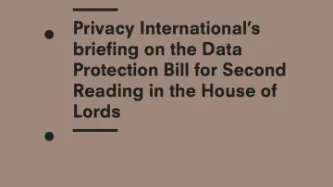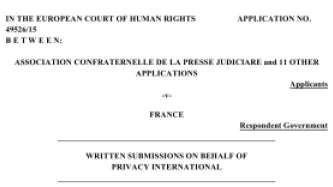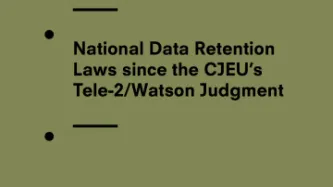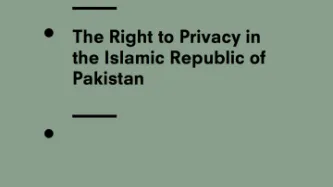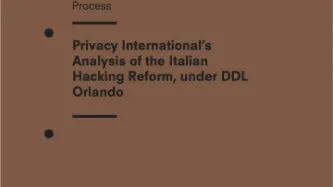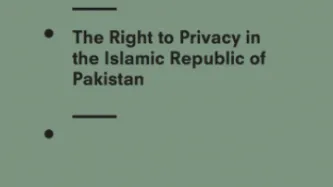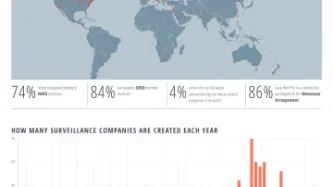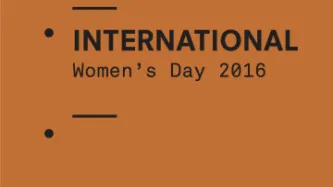Search
Content type: Advocacy
Privacy International's response to the inquiry by the House of Lords Select Committee on Artificial Intelligence.
Content type: Press release
While welcoming the objective of the Bill, Privacy International has sent a briefing to the House of Lords and a letter to Minister of State for Digital, Matt Hancock MP, outlining key concerns and recommendations. The Bill's stated aim is “to create a clear and coherent data protection regime”, and to update the UK data protection law, including by bringing the EU General Data Protection Regulation (GDPR) and the Data Protection Law Enforcement Directive (DPLED) - into the UK domestic system.…
Content type: Advocacy
Privacy International welcomes the aim of this Bill (Data Protection Bill), “to create a clear and coherent data protection regime”, and to update the UK data protection law, including by bringing the EU General Data Protection Regulation (GDPR) and the Data Protection Law Enforcement Directive (DPLED) - into the UK domestic system. This is Privacy International’s briefing on the Data Protection Bill for second reading in the House of Lords
Content type: Long Read
European Court of Human Rights Intervention
On 15 September 2017, Privacy International filed an intervention to the European Court of Human Rights in Association Confraternelle de la Presse Judiciare and 11 Other Applications v. France. This case challenges various surveillance powers authorised under the French Intelligence Act of 24 July 2015 as incompatible with Articles 8 and 10 of the European Convention on Human Rights, which respectively protect the right to privacy…
Content type: Press release
Key points
Privacy International surveyed 21 EU member states' legislation on data retention and examined their compliance with fundamental human rights standards
0 out of the 21 States examined by PI are currently in compliance with these standards (as interpreted in two landmark judgements by the Court of Justice of the European Union: Tele-2/Watson and Digital Rights Ireland)
Privacy International is calling for:
EU member states to review their legislation on data retention…
Content type: Advocacy
This report sheds light on the current state of affairs in data retention regulation across the EU post the Tele-2/Watson judgment. Privacy International has consulted with digital rights NGOs and industry from across the European Union to survey 21 national jurisdictions (Austria, Belgium, Bulgaria, Croatia, Cyprus, Czech Republic, France, Germany, Hungary, Ireland, Italy, Luxembourg, the Netherlands, Poland, Portugal, Romania, Slovakia, Slovenia, Spain, Sweden, and the United…
Content type: News & Analysis
What do Honduras, Pakistan, and Switzerland have in common? They are all bound to respect and protect the right to privacy under Article 17 of the International Covenant on Civil and Political Rights. And in July 2017, they all also happened to be under the scrutiny of the UN Human Rights Committee, which found the countries’ human rights record wanting in many respects, including the scope of their surveillance legislation.
Intelligence sharing
Reviewing Pakistan, the Committee…
Content type: News & Analysis
Privacy International (PI) has today written to the Danish Ministry of Foreign Affairs following further concerning reports about the export of internet surveillance equipment from the country.
We are calling for the government to carry out a full re-assessment of the human rights risks associated with the export of such internet surveillance equipment, and to revoke all licenses where there is a risk to human rights or if the law governing surveillance in the destination country is…
Content type: Advocacy
This stakeholder report is a submission by Privacy International (PI). PI is a human rights organisation that works to advance and promote the right to privacy and government surveillance around the world. Privacy International wishes to bring concerns about the protection and promotion of the right to privacy for consideration in Pakistan’s upcoming review at the 28th session of the Working Group on the Universal Periodic Review.
Content type: Press release
Please find attached a copy of the briefing along with promotional photographs with the briefing.
Privacy International has today sent top EU and UK Brexit negotiators* a briefing on their vulnerability to potential surveillance by each other, and others. Brexit negotiations are to begin today.
The global privacy rights NGO has highlighted to the negotiators the risk of sophisticated surveillance capabilities being deployed against each other and by others, and provided…
Content type: Advocacy
Privacy International generally opposes hacking as a tool for surveillance. While the DDL Orlando is an opportunity to fill the current legislative gap in the use of hacking for investigative purposes, PI believes that it falls short of the requirements of existing international human rights law.
Content type: Report
This stakeholder report is a submission by Privacy International (PI). PI is a human rights organisation that works to advance and promote the right to privacy and ght surveillance around the world. Privacy International wishes to bring concerns about the protection and promotion of the right to privacy for consideration in Pakistan’s upcoming review at the 28th session of the Working Group on the Universal Periodic Review.
Content type: Long Read
This week, Privacy International, together with nine other international human rights NGOs, filed submissions with the European Court of Human Rights. Our case challenges the UK government’s bulk interception of internet traffic transiting fiber optic cables landing in the UK and its access to information similarly intercepted in bulk by the US government, which were revealed by the Snowden disclosures. To accompany our filing, we have produced two infographics to illustrate the…
Content type: Press release
PI Research Officer Edin Omanovic said:
“The European Commission has proposed sweeping updates [PDF] to trade regulations in an effort to modernise the EU’s export control system and to ensure that the trade in surveillance technology does not facilitate human rights abuses or internal repression.
Privacy International welcomes the intentions of the proposed changes in terms of protecting human rights as it does all such moves. More than half of the world’s surveillance…
Content type: Press release
Key points
Privacy International, Liberty, Amnesty International, and seven other human rights organizations challenge UK mass surveillance and UK access to US mass surveillance at the European Court of Human Rights
This is the first case before the European Court of Human Rights to directly challenge UK and US mass surveillance revealed by the Snowden disclosures
National courts and oversight bodies have failed to rein in mass surveillance practices that impact hundreds of millions of…
Content type: News & Analysis
Privacy International is today proud to release the Surveillance Industry Index (SII), the world's largest publicly available educational resource of data and documents of its kind on the surveillance industry, and an accompanying report charting the growth of the industry and its current reach.
The SII, which is based on data collected by journalists, activists, and researchers across the world is the product of months of collaboration between Transparency Toolkit and Privacy…
Content type: News & Analysis
Another committee-led scrutiny. Another list of changes that need to be made to the Investigatory Powers Bill. This seems familiar.
The Joint Committee on Human Rights has weighed in with scrutiny of the Investigatory Powers Bill prior to the Bill’s debate and vote in the House of Commons on the 6 and 7 June. The recommendations the report contains once again raise questions about the fitness of the Bill to be passed in its current form.
The Committee identified thematic warrants - which…
Content type: News & Analysis
The much maligned Prevention of Electronic Crimes Bill (PECB) was dealt a critical blow by senior Senate members on Tuesday in Pakistan. Digital Rights Foundation, in conjunction with Bolo Bhi, held a consultation for members of the Pakistan Senate, other lawmakers, members of civil society, and the media.
The aim of the consultation was to discuss the Bill, the problematic provisions and amendments that have been suggested in its most recent version, and the steps…
Content type: Long Read
1984: A broad law, a broad power and a whole lot of secrecy
In the wake of litigation brought by Privacy International (‘PI’) and as the Government prepared to introduce the Draft Investigatory Powers Bill (‘IP Bill’) in November 2015, there was a cascade of ‘avowals’- admissions that the intelligence agencies carry out some highly intrusive surveillance operations under powers contained in outdated and confusing legislation.
It is disappointing that it has been almost six months since…
Content type: News & Analysis
PI's full analysis can be read here
On 29 February 2016, the European Commission and the US government released the details of the proposed EU-U.S. “Privacy Shield”. The “Privacy Shield” replaces the now defunct so-called “Safe Harbor”.
The Privacy Shield is in fact a significant number of documents from various parts of the U.S. administration, which merely outline the existing, weak U.S. safeguards applicable to personal data of EU citizens. These documents are…
Content type: Report
The right to privacy is a qualified right. Gender is not and cannot be its qualification.
For this year’s International Women’s Day, the Privacy International Network is sharing some of its successes as well as the challenges and opportunities we face in at the intersection of gender issues and the right to privacy. Click here to see this feature.
Interferences and violations of the right to privacy, as described in the UN Declaration of Human Rights, affect society as a whole. However,…
Content type: Long Read
The Investigatory Powers Tribunal (“IPT”) today held that GCHQ hacking of computers, mobile devices and networks is lawful, wherever it occurs around the world. We are disappointed that the IPT has not upheld our complaint and we will be challenging its findings.
Our complaint is the first UK legal challenge to state-sponsored hacking, an exceptionally intrusive form of surveillance. We contended that GCHQ hacking operations were incompatible with democratic principles and human rights…
Content type: News & Analysis
Sometimes it takes an unexpected stranger to remind you what you have, and what you are at risk of losing. Roman Zakharov, a Russian publisher who challenged Russia’s surveillance legislation, is that stranger for many Brits and Europeans. The Grand Chamber of the European Court of Human Rights judgement on Friday 4 December 2015 was remarkable, not because it tore up the rule book on the jurisprudence surrounding state surveillance in the Council of Europe, but because it followed…
Content type: News & Analysis
This guest post was written by Nighat Dad and Adnan Chaudhry of Digital Rights Foundation.
It is the role of the state to protect its citizens from threats to their life and liberty. But in protecting its citizens, the state’s own aims cannot be counterproductive and erode the security found in rights like privacy and freedom of expression that are vital to a democratic system.
However, it has too often been the case that governments will pursue and enact legislation that provides more…
Content type: Press release
A joint statement from international and domestic civil society organisations expresses continued serious concerns regarding the passage of Pakistan’s Prevention of Electronic Crimes Bill. Privacy International, ARTICLE 19, Human Rights Watch, Association for Progressive Communications, Digital Rights Foundation, and other human rights organisations including the Human Rights Commission of Pakistan are calling for the bill currently awaiting debate in the National Assembly to be scrapped and…
Content type: News & Analysis
Today the Grand Chamber of the Court of Justice of the European Union ruled that mass surveillance is in violation of the right to privacy and that a legal system that provides no legal redress against interference with someone's privacy falls short of EU human rights standards.
The Court was seized following a complaint initiated by Mr Schrems to the Irish Data Protection Commissioner about the transfer of his Facebook data from Ireland to the US under the now defunct “…
Content type: Press release
28 October 2015
Leading privacy and consumer organizations meeting in Amsterdam this week called on data protection officials around the world to support a meaningful legal framework that would protect the fundamental rights of both citizens and consumers in the online era.
In a statement issued today at the International Data Protection and Privacy Conference, the organizations criticized a just-released “Bridges” report that primarily recommended a continuation of industry self-regulation…
Content type: News & Analysis
Every government seems to want to spy in Pakistan. The US' National Security Agency (NSA) tapped the fibre optic cables landing in Karachi, among others, and used 55 million phone records harvested from Pakistani telecommunications providers for an analysis exercise. The United Kingdom's Government Communications Headquarters (GCHQ) had a store of SIM keys from Mobilink and Telenor networks, two of the country's biggest providers.
But the Pakistani government, specifically the…
Content type: Advocacy
The Pakistani government has significantly expanded its communication interception activities. This Privacy International report covers the intelligence services plan to capture all IP-traffic in Pakistan and other initiatives, pointing to gaps in the laws governing surveillance.
Content type: Report
The Pakistani government has significantly expanded its communication interception activities. This Privacy International report covers the intelligence services plan to capture all IP-traffic in Pakistan and other initiatives, pointing to gaps in the laws governing surveillance.

